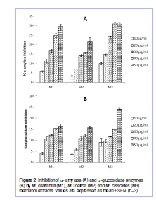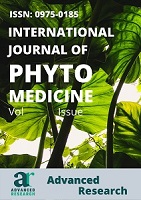Ethnobotanic survey of the galactagogue plants used by Brong and Koulango, two indigenous peoples in Gontougo region/Côte d’Ivoire
Keywords:
galactagogues, lactation specialist, Medicinal plants, Gontougo region, Côte d’IvoireAbstract
This study aims to inventory plants and traditional medicinal recipes used by the population of Tanda (Gontougo region, Côte d’Ivoire) to boost milk production in women. Using a questionnaire, the methods consisted in carrying out a survey near the traditional medicine actors of 15 localities. Among 47 actors of traditional medicine aged from 34 to 80 years investigated, 70.21 percent. were women. These women had more knowledge on the galactagogue plants than the men (29.79 percent.of the actors). They were represented by matrons, specialists in lactation, healers and saleswomen of medicinal plants. Among about fifteen listed galactagogue plants, Euphorbia hirta (Euphorbiaceae) was the most used plant. Leaves represented the majority of the medicinal preparations (73.33 percent.). These preparations were in 66.67 percent. of the cases associated with various other biological or mineral ingredients (pepper, meat, vegetables, ash, kaolin…). The direct application of crushings on mammary glands (cutaneous way) by friction constituted the principal route of administration (66.67 percent. of the medical receipts). Traditional medicine actors of the town of Tanda are actively interested in the search of solutions to the lacteal secretion issues which occur in the breast-feeding mothers. They have about fifteen medicinal plants which enable them to stimulate the production of maternal milk when a need is expressed.
References
Krovnov S, Miurcov L, Mach L. Antioxidant activity and
protecting health effects of common medicinal plants. Adv
Food Nutr Res. 2012;67:75–139. Available from: DOI:
1016/B978-0-12-394598-3.00003-4.
Khalaf NA, Shakya AK, Al-Othman A, El-Agbar Z, Farah
H. Antioxidant activity of some common plants. Turk J of
Biology. 2008;32(1):51–55.
Ayeleso AO, Oguntibeju OO, Brooks NL. In vitro study on
the antioxidant potentials of the leaves and fruits of Nauclea latifolia. Sci. World J. 2014;8. Article ID 437081.
Available from: 10.1155/2014/437081.
Chawla A, Chawla R, Jaggi S. Microvasular and macrovascular complications in diabetes mellitus: Distinct or continuum? Indian J Endocr Metab. 2016;20(4):541–546.
Available from: DOI:10.4103/2230-8210.183480.
Ahmed MF, Kazim SM, Ghori SS, Mehjabeen SS, Ahmed
SR, Ali SM, et al. Antidiabetic activity of Vinca rosea
extracts in alloxan-induced diabetic rats. Int J Endocrinol.
;Available from: 841090.DOI:10.1155/2010/841090.
wikipedia. Momordica;. Available from: https://en.
wikipedia.org/wiki/Momordica,.
H, Ss R. A three-genome phylogeny of Momordica (Cucurbitaceae) suggests seven returns from dioecy to monoecy and recent long-distance dispersal to Asia. Mol
Phylogenet Evol. 2010;54(2). Available from: 553-560.
PMID19686858.DOI:10.1016/j.ympev.2009.08.006.
Acquaviva R, Giacomo D, Vanella C, Santangelo L, Sorrenti R, Barbagallo V, et al. -. Momordica foetida Schumach et Thonn Molecules. 2013;18(3):3241–3249. Available from: DOI:10.3390/molecules18033241.
Joseph B, Jini D. Antidiabetic effects of Momordica charantia (bitter melon) and its medicinal potency. Asian
Pac J Trop Dis. 2013;3(2). Available from: 93-102.DOI:
1016/S2222-1808(13)60052-3.
Anilakumar KR, Kumar GP, Ilaiyaraja N. Nutritional,
pharmacological and medicinal properties of Momordica
charantia. Int J Nutr And Food Sci. 2015;4(1). Available
from: 73-83.DOI:10.11648/j.ijnfs.20150401.21.
Ojong LJ, Abdou JP, Kandeda AK, Yaya A, Tchamgoue
AD, Tchokouaha L. Anticonvulsant and in Vitro Antioxidant Activities of Momordica Cissoides L. (Cucurbitaceae). J App Pharm Sci. 2016;6(4). Available from:
-123.DOI:10.7324/JAPS.2016.60416.
Raza H, Ahmed I, John A, Sharma AK. Modulation of xenobiotic metabolism and oxidative stress in
chronic streptozotocin-induced diabetic rats fed with Momordica charantia fruit extract. J Biochem Mol Toxicol.
;14:10711628–10711628.
Akinwumi OA. Phytochemical screening and chemical
analysis of methanolic extracts of the leaves of three momordica species. FUW Trends in Science & Technology
Journal. 2017;2(2):13–13.
Wickramaratne MN, Punchihewa JC, Wickramaratne D.
In-vitro alpha amylase inhibitory activity of the leaf extracts of Adenanthera pavonina. BMC Complem and
Altern Med. 2016;Available from: 16:466.DOI10.1186/
s12906-016-1452-y.
Keser S, Celik S, Turkoglu S, Yilmaz O, Turkoglu I. Hydrogen peroxide radical scavenging and total antioxidant
activity of hawthorn. Chemistry Journal. 2012;2(1):9–12.
Dinis TC, Madeira VM, Almeida LM. Action of
phenolic derivatives (acetaminophen, salicylate, and 5-
aminosalicylate) as inhibitors of membrane lipid peroxidation and as peroxyl radical scavengers. Arch Biochem
Biophys. 1994;315(1):7979394–7979394.
Nagulendran KR, Velavan S, Mahesh R, Begum VH.
In vitro antioxidant activity and total polyphenolic content of Cyperus rotundus rhizomes. E-Journal of Chem
istry. 2007;4(3):440–449. Available from: 10.1155/2007/
Okwu DE, Iroabuchi F. Phytochemical composition and
biological activities of Uvaria chamae and Clerodendoron
splendens. Journal of Chemistry. 2009;6(2):973–4945.
Re R, Pellegrini N, Proteggente A, Pannala A, Yang M,
Rice-Evans C. Antioxidant activity applying an improved
ABTS radical cation decolorization assay. Free Radic. Biol
Med. 1999;26:10381194–10381194.
Kazeem MI, Adamson JO, Ogunwande IA. Modes of inhibition of -amylase and -glucosidase by aqueous extract of
Morinda lucida Benth leaf. BioMed ResInt. 2013;6. Available from: 10.1155/2013/527570.
Kwon YI, Apostolidis E, Shetty K. Evaluation of pepper
(Capsicum annuum) for management of diabetes and hypertension. J Food Biochem. 2007;31(3). Available from:
-385.DOI:10.1111/j.1745-4514.2007.00120.x.
Carocho M, Ferreira I. A review on antioxidants, prooxidants and relaed controversy: natural and synhetic compounds, screening and analysis methodologies and future
perspecives. Food Chem Toxicol. 2013;Available from:
:15-25.DOI:10.1016/j.fct.2012.09.021.



